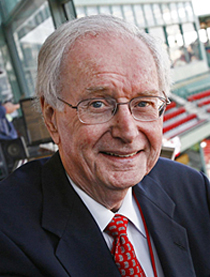
Culture
Nobody ever called him by his given name except possibly his mother when he misbehaved as a child. It was always "Tip."

Flavin
My friend Tip Thiboutot died on Oct. 16. He was 85 years old. Tip was a great pal and a loving husband, father, and grandfather.
To be honest about it, he was a better man than I am -- by a wide margin. Then again, he was also a better man than anyone else I ever met.
I first crossed paths with Armand Thiboutot when we were both undergraduates at Stonehill College way back in the '50s. Nobody ever called him by his given name except possibly his mother when he misbehaved as a child. It was always "Tip."
He was an extremely likable kid from Fall River who was a terrific basketball player; but he still had a lot of growing up to do. He hardly cracked a book, never bothered to study, and seemed to care for nothing beyond basketball. After summer break, when we all regathered for a new school year, Tip was not among us. He had, unsurprisingly, flunked out of Stonehill and had joined the army.
Some months later, word got back to school that he had been involved in a horrific automobile accident and had been paralyzed below the waist; one leg had been totally amputated and the other rendered useless.
I remember thinking, upon hearing the news, "What a waste. If only he had applied himself, he might have amounted to something." Then I put him out of my mind.
Fast forward 20 years. My youngest daughter Meredith was in kindergarten in Wayland, and became best friends with a little girl named Michele Thiboutot. Meredith loved going over to Michele's house because, she said, Michele's father let the girls play in his wheelchair when he relaxed in an easy chair. Thus, it was that Tip and I got reconnected because of two little girls, his daughter and mine.
Outwardly, he seemed much the same as he was when we first knew each other, with an impish sense of humor that drew people to him. But he was a changed man. He had grown up; had he ever. He'd earned a Bachelor of Arts degree in philosophy at Boston University. He went on to earn his master's degree in French from B.U., and then his PhD. And he didn't stop there. He continued his studies in French history and culture at the Sorbonne in Paris, considered by many to be one of, if not the most prestigious university in the world. Not bad for a guy who had flunked out of Stonehill.
Patricia DeSimone was a lovely young woman who had been his nurse through the long and, I'm sure, at times dark, days of his recovery. Along the way, he fell in love with her and she with him. Her family and friends did their best to dissuade her from marrying him because they thought being married to someone as affected as he'd been would limit her chances of happiness. But she knew of his remarkable inner strength, and viewed marriage to him as an opportunity to share in undreamed of adventures. She was right, of course, and the two became a great team as they traveled the world together. They made many trips to Paris, where they drank in the culture of the land they learned to love.
Through all that had happened, he never lost his passion for basketball, and as soon as he was able to he joined a wheelchair basketball team, the New England Clippers. A few years later, he formed his own team, the Boston Mustangs. He played and coached for the next 40 years. In 1984, he was the coach of the USA men's team in the Paralympic Games. He became very involved in the organization and the growth of the National Wheelchair Basketball Association (NWBA) and the International Wheelchair Basketball Federation (IWBF). I knew he was a big deal but I didn't know how big until his death. He was constantly referred to in death notices as a "legend" and a "pioneer." He wasn't just well-known, he was beloved throughout the wheelchair basketball community all around the world.
You'd never know it if you were in his company. He never spoke about his importance or his intellectual accomplishments. I remember us laughing a lot, about what I have no idea, but he was wonderful company. He was elected to the NWBA Hall of Fame in 1993, and in 2002, the IWBF presented him with its Gold Triad Medal for his commitment to wheelchair basketball. In 2012, he co-authored a book, "Wheelchairs Can Jump," which is the definitive history of the sport.
When his two daughters were grown and married (interestingly, Michele and her husband, Guy Morgan, relocated to Tip's beloved France, where they are parents of three children), and upon his retirement from his professional career of promoting equal rights and access for persons with disabilities, Tip and Patricia bought an apartment in Boston's North End, where they became familiar and popular figures on the colorful old neighborhood's streets and in its cafes. Everyone knew them, it seemed. And to know them was to love them.
For years, they were regulars for Celtics' games at Boston Garden.
Several weeks ago, Tip and Patricia had just returned from a visit in Maine with their daughter Anna and her husband, Matthew Welch, when he finally ran out of gas. He checked himself into the hospital and he died the next day.
We shall not see his like again. I've known a lot of famous and accomplished people in my day, but I'll say this with certainty: Tip Thiboutot was the best man I ever knew.
God bless his memory.
- Dick Flavin is a New York Times bestselling author; the Boston Red Sox "Poet Laureate" and The Pilot's recently minted Sports' columnist.
Recent articles in the Culture & Events section
-
What is truth?Michael Reardon
-
The 75th anniversary of St. Ignatius of Loyola Church, Chestnut HillThomas Lester
-
The most important prayer you already knowLaura Kelly Fanucci
-
Two years after DobbsRussell Shaw
-
Scripture Reflection for July 21, 2024, Sixteenth Sunday in Ordinary TimeDeacon Greg Kandra





